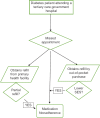The determinants of out-of-pocket health-care expenses for diabetes mellitus patients in India: An examination of a tertiary care government hospital in Delhi
- PMID: 32670834
- PMCID: PMC7342337
- DOI: 10.4103/picr.PICR_169_18
The determinants of out-of-pocket health-care expenses for diabetes mellitus patients in India: An examination of a tertiary care government hospital in Delhi
Abstract
Objective: To assess the determinants of out-of-pocket (OOP) expenses on diabetes-related treatment incurred in patients attending outpatient clinics in a tertiary care hospital in Delhi, India.
Study design: A cross-sectional analysis of baseline data from a quasi-experimental study was conducted over 8 months in 2016 in a major tertiary care hospital in Delhi.
Methods: The study included 375 diabetes patients up to 65 years of age on treatment for at least a year without significant complications. Data were collected through a patient interview schedule.
Results: Of the previous six scheduled appointments, at least two missed appointments were seen in 267 (71.2%) patients. The average patient's OOP expenditure on diabetes-related medicines was ₹63.5 a month, a similar amount was spent on traveling to and from health facilities. Sixty-four (17.1%) patients took antidiabetic medication for <85% of the days in the previous 3 months.
Conclusion: There exists a high burden of missed clinic appointments among diabetes patients in tertiary care government health settings in India. This appears to be related to the high cost in terms of both time and money involved in attending appointments for the modest benefit of a dispensation of a 15-day drug refill. Health policy measures focused on strengthening medication coverage need to explore the balance of costs and benefits when determining the frequency of clinical appointments in these settings.
Keywords: Delhi; India; diabetes; medication adherence; out-of-pocket expenses.
Copyright: © 2020 Perspectives in Clinical Research.
Conflict of interest statement
There are no conflicts of interest.
Figures
References
-
- International Diabetes Federation. IDF Diabetes Atlas. 6th ed. Brussels: International Diabetes Federation; 2015. - PubMed
-
- Wild S, Roglic G, Green A, Sicree R, King H. Global prevalence of diabetes: Estimates for the year 2000 and projections for 2030. Diabetes Care. 2004;27:1047–53. - PubMed
-
- World Health Organization. Diabetes Country Profile: India World Health Organization. 2016. [Last accessed on 2018 Jan 26]. Available from: http://wwwwhoint/diabetes/country-profiles/ind_enpdfua=1 .
-
- Misra A, Pandey RM, Devi JR, Sharma R, Vikram NK, Khanna N, et al. High prevalence of diabetes, obesity and dyslipidaemia in urban slum population in Northern India. Int J Obes Relat Metab Disord. 2001;25:1722–9. - PubMed
LinkOut - more resources
Full Text Sources

